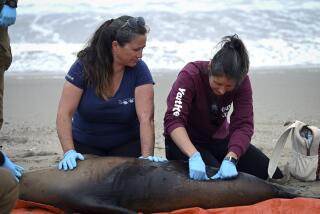Rattlesnake season begins with a vengeance in Southern California
Rattlesnake season is arriving California.
On Tuesday, a 66-year-old man was flown to a trauma center after being bit on both of his index fingers outside his home in Ocotillo Wells in eastern San Diego County.
For the record:
9:18 p.m. Aug. 8, 2019A previous version of this article referred to rattlesnakes as poisonous. More precisely, they are venomous.
Earlier this month, a dog needed 20 stitches after being bitten by a rattlesnake in Laguna Beach.
The state receives about 300 calls a year reporting bites, most frequently between April and October. The highest number of bites frequently are reported in May.
This winter’s rains have led to a lot of vegetation growth, which attracts rattlesnake prey such as mice and other rodents, according to Barbara Norton, OC Parks operations manager.
Norton oversees four Orange County parks, including Laguna Coast and Aliso and Wood Canyons wilderness parks.
“We are seeing rattlesnakes almost daily,” Norton said. “It’s important to note that rattlesnakes don’t chase people but only bite as a defense mechanism when provoked. They want to save their venom to hunt for prey. Interestingly, almost all bites on humans occur on the hand by people trying to pick them up.”
San Diego County animal control officers have answered more than 275 rattlesnake-related calls since January, a roughly 40% increase over the same period last year. With rattlesnake sightings typically peaking during the hot and dry summer months, Animal Services routinely receives more than 1,000 calls a year.
Rattlesnake populations fluctuate based largely on rises and dips in rodent populations, which is a main source of food for the reptiles.
“If someone calls and says there’s a snake in our backyard, we notify an officer and it’s one of our highest priorities,” said Daniel DeSousa, director of county Animal Services. “They have the training and equipment to grab the snake and put it in the bucket and put it somewhere in the community that’s safe for the snake and the residents.”
More than 155 rattlesnakes have been removed by the county from homes and public spaces this year. The San Diego Humane Society handles animal control for the cities of Oceanside, Vista, San Marcos, Escondido and Poway.
Sightings were most concentrated in areas north of Interstate 8. People in the region surrounding Rancho Peñasquitos and the Black Mountain Open Space Park have logged the most calls this year — nearly two dozen.
Residents should report only rattlesnakes that are in homes or populated areas, DeSousa said. The reptiles should never be disturbed if found in canyons or the backcountry.
When identifying the venomous snakes, it’s important to remember they can lose their rattles over time. Often confused with gopher snakes, rattlesnakes have wide triangular heads and thin necks.
Several species of rattlesnakes are found in San Diego County. Coastal and mountain areas are inhabited by Western, Southwestern Speckled and Red Diamond rattlers. The Colorado Desert Sidewinder is found in the county’s desert region.
While dangerous to humans, these snakes are important for the county’s ecology, said Bradford Hollingsworth, biologist and curator of herpetology with the San Diego Natural History Museum.
“Rattlesnakes are critical components of our ecosystem,” he said. “Their persecution would only lead to ecological problems. They control our rodent populations and keep them in check.”
Victims of rattlesnake bites should seek immediate medical attention at an emergency room. Tourniquets are highly discouraged, as is the use of ice or a cold compress.
Rattlesnake bites cause painful swelling, bleeding and bruising, but are rarely fatal, according to the California Poison Control System. Those most at risk for potentially deadly impacts are children and pets.
Bite prevention measures include wearing boots and long pants when hiking and inspecting logs and rocks before sitting in the backcountry. The snakes should never be disturbed, even if thought dead or sleeping.
Smith writes for the San Diego Union-Tribune, Alderton for Times Community News.
ALSO
Marines, looking to expand Twentynine Palms training grounds, airlift 1,100 desert tortoises
The trees that make Southern California shady and green are dying. Fast.
Polar bear at SeaWorld San Diego dies after a brief, unexplained illness
More to Read
Sign up for Essential California
The most important California stories and recommendations in your inbox every morning.
You may occasionally receive promotional content from the Los Angeles Times.











